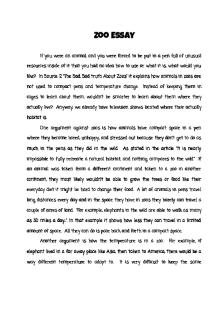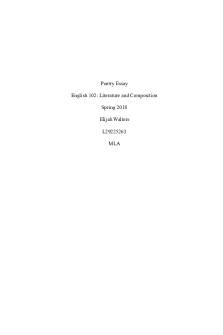Essay on poverty - Grade: B PDF

| Title | Essay on poverty - Grade: B |
|---|---|
| Course | Sociology |
| Institution | Memorial University of Newfoundland |
| Pages | 4 |
| File Size | 113 KB |
| File Type | |
| Total Downloads | 85 |
| Total Views | 129 |
Summary
Modernity and Poverty...
Description
Critically analyze the relationship between poverty, inequality, and modernity? Our society is a blend of all mishaps and misfortunes that exist. Poverty, inequality, ignorance, discrimination are just some of the most prevalent. These issues are not new to this world, unfortunately it is hard if not impossible to alleviate these miseries. My outlook at life is perhaps not negative, I would rather proclaim it more realistic than idealistic. These pressing issues will be explored in this essay with emphasis placed on economic, social and emotional perspectives. The poems of week one reflected on the poor experience with heart touching details. To fully enjoy these poems, one must feel and empathize with them. Faiz Ahmed Faiz eloquently unravels the life of the poor. The reasons of poverty are many such as, uneven distribution of income, wealth and resources, injustice, the theory of ‘Survival of the Fittest’ by Charles Darwin at play and so on, but Faiz in his poem ‘Kutte’ throws light at poverty differently. The idea of beggary runs in the family among these beggars who are habitually helpless to beg. They do not even bother to change their condition. “[O]n whom is bequeathed the appetite for beggary,” in fact the case is no different than that of a drug addict, too oblivious to change their condition and surroundings despite knowing that there is a way to earn. The author points out that it is somewhat absurd that the beggars are obsessed with the idea of dependency at the mercy of other human beings. They have the potential to improve their situations but prefer the easy way even though it is humiliating. A single penny or a piece of bread gives them hope and forces them to stay in that condition. Towards the end of the poem, the author focuses on their capability and potential which they fail to recognize, perhaps because it is beyond their knowledge that they fail to discern. “[S]hould they, the oppressed, ever raise their heads humankind would rue every condescension.” The author explains that they are so shameless when it comes to begging that
they have no regrets at the constant rebukes and scorns which the society imparts them with. The author also says that if these beggars were to realize the importance of life and its possibilities, they are capable enough of transforming. Therefore, the only thing which they lack is the ability to fathom their condition. A massive population lives in extreme poverty and to the privileged the poor are untouched, unheard and helpless. Economically, they are a burden on the society. As Maimonides said, “Give a man a fish and you feed him for a day; teach a man to fish and you feed him for a lifetime.” http://www.brainyquote.com/quotes/quotes/m/maimonides326751.html. But it is not simple as it sounds. There is a massive role of power politics at play. The poor remain poor because the rich do not want them to learn and educate themselves so that the rich can use them as indentured labor or slaves. Faiz argues in his poem that widespread poverty is accepted as norm and even those who retaliate against their conditions, their measures go unnoticed, in vain. But they do not really need our sympathy. What they need is, as Faiz says in his last stanza, they need a wakeup call, it alone can solve half of their problem. The poem The Nobodies by Eduardo Galeano, highlights the misfortunes of inequality and poverty. It perhaps is a comparison between the ‘everybody’ – the rich and the ‘nobody’ – the poor. The rich dream of buying a dog while the poor flea the nightmare of living life of a dog. The tone of hopelessness is inherent in the poem. Their lives would not change ‘…today or tomorrow or ever’. The poet sketches a depressing picture of the lower working class, their lives seem worthless, useless and forsaken. This directly implies that the;’everybodies’ are totally void of feeling and empathy. This is one of the main reasons injustice and inequality prevails. The poem is somewhat analogical to Faiz’s ‘Kutte’ in the sense that to fill their stomachs, the poor completely rely on every
piece of bread they find and it keeps them going and makes them stick to their condition. Inequality predominates because of various reasons such as the theory of ‘The Survival of the fittest’ by Charles Darwin, the selfishness of people who own the resources – every man on his own, the greed and insatiable hunger of materialistic things. The economic principle of unlimited wants and limited resources perfectly delineates my point. Inequality exists in all genders, races, religion, and every sphere of life. Quite the contrary, ‘The Eyes of the Poor’ is full of emotion and empathy. It portrays the invisible wall among people despite being so close – a wall that separates empathy and apathy. These people are among us, in our families and among our friends who maintain distance from the ‘untouchable’, who do not possess any feelings for the unfortunate. Baudelaire explains that this man with children in rags too have certain rights to enjoy the modernity and a good experience but the question is from whom they should fight for their rights and equality. Who will grant them what they deserve? Towards the end of the explanation offered by Marshall Berman, he says ‘… liberal sentimentally and reactionary ruthlessness are equally futile.’ Realistically just feeling and not feeling emotions of sympathy would not solve anything, ‘Only a radical reconstruction of modern society could even begin to heal the wounds…’ Poverty and inequality have an inverse relationship with modernity, for example consider developed countries such as Norway. High standards of living exists because of embracing change and modernity. There had been revolutions, wars and battles to alleviate the curse of inequality in the history of mankind. It is not just two lovers having a difference of opinion which makes the man hate her for her thinking, it is as Berman puts it ‘… a
radical opposition in ideology and politics’ hence these spectacles are not mere simplistic concepts but a whole a set of complicated ideologies....
Similar Free PDFs

Essay on poverty - Grade: B
- 4 Pages

Poverty essay - Grade: C+
- 9 Pages

Essay on Dna forms - Grade: B
- 4 Pages

SO4032- Essay on Race - Grade: B
- 6 Pages

Rogerian Essay - Grade: B
- 2 Pages

Zoo Essay - Grade: B+
- 2 Pages

Causation Essay - Grade: B
- 4 Pages

Final Essay - Grade: B+
- 12 Pages

Propaganda Essay - Grade: b
- 4 Pages

Poetry Essay - Grade: B
- 5 Pages

Galileo Essay - Grade: B+
- 6 Pages

Fiction Essay - Grade: B
- 7 Pages

EPQ Essay - Grade: B+
- 10 Pages

Law essay - Grade: B
- 9 Pages

Persuasive Essay - Grade: B
- 3 Pages

Evicted Essay - Grade: B+
- 3 Pages
Popular Institutions
- Tinajero National High School - Annex
- Politeknik Caltex Riau
- Yokohama City University
- SGT University
- University of Al-Qadisiyah
- Divine Word College of Vigan
- Techniek College Rotterdam
- Universidade de Santiago
- Universiti Teknologi MARA Cawangan Johor Kampus Pasir Gudang
- Poltekkes Kemenkes Yogyakarta
- Baguio City National High School
- Colegio san marcos
- preparatoria uno
- Centro de Bachillerato Tecnológico Industrial y de Servicios No. 107
- Dalian Maritime University
- Quang Trung Secondary School
- Colegio Tecnológico en Informática
- Corporación Regional de Educación Superior
- Grupo CEDVA
- Dar Al Uloom University
- Centro de Estudios Preuniversitarios de la Universidad Nacional de Ingeniería
- 上智大学
- Aakash International School, Nuna Majara
- San Felipe Neri Catholic School
- Kang Chiao International School - New Taipei City
- Misamis Occidental National High School
- Institución Educativa Escuela Normal Juan Ladrilleros
- Kolehiyo ng Pantukan
- Batanes State College
- Instituto Continental
- Sekolah Menengah Kejuruan Kesehatan Kaltara (Tarakan)
- Colegio de La Inmaculada Concepcion - Cebu